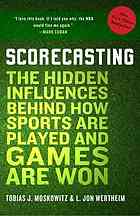
Scorecasting
The Hidden Influences Behind How Sports Are Played and Games Are Won
کتاب های مرتبط
- اطلاعات
- نقد و بررسی
- دیدگاه کاربران
نقد و بررسی

December 1, 2010
In a Freakonomics for sports, an economist and a sportswriter use the power of data analysis to debunk some of the sports world's conventional wisdom.
Sports Illustrated senior writer Wertheim's (Strokes of Genius: Federer, Nadal, and the Greatest Match Ever Played, 2010) familiar, straightforward style effectively complements the reams of data provided by Moskowitz (Finance/Univ. of Chicago) in this examination of a series of sports-related issues, including home-field advantage, the effectiveness of minority coaches and the hoary adage that defense wins championships. The conclusions they draw range from startlingly persuasive to shrug-inducing, a combination that results, perhaps, from the overall credibility of their arguments and the recent profusion of similar literature that makes once unthinkably counterintuitive arguments less eye-opening. Perhaps the authors' most compelling—and pot-stirringly controversial—argument is the contention that home-field advantage, a statistically credible phenomenon in every sport, is almost exclusively a result of referee bias, itself a product of the psychological effect of home fans exhorting officials to make calls that favor their team, a subconscious influence even the best officials cannot overcome. Less convincing is their examination of the efficacy of performance-enhancing drugs. While they show a plausible link between low income and usage—a phenomenon that occurs in multiple countries, a logical result of those with less to lose and more to gain trying to cheat their way to success—they fail to account for players who have used drugs that either cannot be tested for or in such a way that they managed to avoid detection. Also, old-school fans will undoubtedly have trouble embracing concepts like there being no such thing as momentum and the attribution of "hot" and "cold" streaks primarily to random chance.
Hardly groundbreaking, but a well-conceived and -executed addition to the burgeoning movement of stats-based sporting analysis.
(COPYRIGHT (2010) KIRKUS REVIEWS/NIELSEN BUSINESS MEDIA, INC. ALL RIGHTS RESERVED.)

January 1, 2011
Defense wins championships! So declared a triumphant Michael Jordan in 1991, invoking a hallowed sports mantra. But Jordans assertion melts into clich' when Moskowitz and Wertheim expose it to statistical calculations revealing that, regardless of the sport, offense proves just as decisive as defense. Indeed, in their wide-ranging iconoclasm, the authors repeatedly poke arithmetic holes in what everyone in sports supposedly knows. Typical is their number-crunching assault on the popular explanation of home-field advantage as a consequence of visiting teams road fatigue. Home teams win, the authors demonstrate, chiefly because referees tend to see plays their wayespecially when the crowd of spectators grows large. Parsing of data illuminates off-field behavior, too, explaining which athletes use steroids and which ones use marijuana. Even the curse hanging over the Chicago Cubs comes into focus then the analysts ignore the billy-goat myth and statistically assess a management style fostered by fans perversely loyal to lovable losers! Sports buffs eager to win their next barroom argument will be lining up for this book.(Reprinted with permission of Booklist, copyright 2011, American Library Association.)

























دیدگاه کاربران